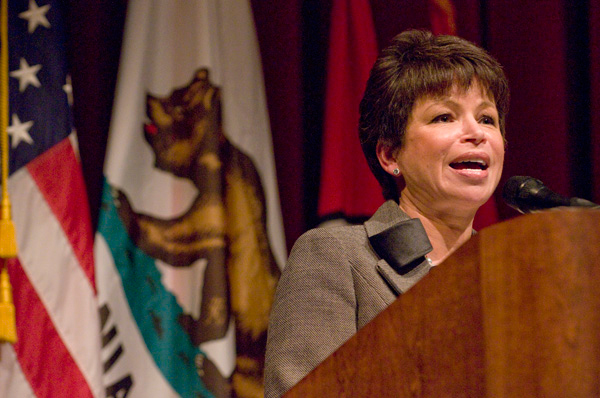Top Obama adviser encourages Stanford students to follow path of public service
When a good job at a private law firm left her unfulfilled, Valerie Jarrett jumped into a career in public service that took her from Chicago's city hall to the White House.
She's been called the president's "big sister," the "first friend" and the "other side of Obama's brain."
But long before Valerie Jarrett was a top adviser to Barack Obama, she went through what she calls "the dark years" – a time when she didn't feel she was making much of a difference.
"I took the path of least resistance," Jarrett told an audience at Stanford's Memorial Auditorium on Thursday. "I'm not proud of it. But I did."
At a time when her fellow law school graduates were being recruited by private firms in the early 1980s, Jarrett followed suit. She was making good money and had a nice office on the 79th floor of Chicago's Sears Tower that overlooked Lake Michigan.
And she was miserable.
"It wasn't satisfying me," she said. "You can't do what everyone else thinks you should do. You have to assess your strengths and weaknesses and passions."
Worked for Chicago's first black mayor
So at the encouragement of some friends, she jumped into the public sector working for Harold Washington, Chicago's first black mayor.
"It gave me a sense of working for something bigger than myself," Jarrett said.
It also gave her a start to a long career in public service that catapulted her from city hall to the White House, where she is now one of Obama's three chief advisers. She also runs the White House offices of Public Engagement, Intergovernmental Affairs and Urban Affairs, and chairs the White House Council on Women and Girls.
"I've had nine jobs," she said. "If I stayed in that beautiful office in Sears Tower, you never would've invited me to speak to you today. And I'd be miserable."
Jarrett's remarks came as she delivered this year's St. Clair Drake Memorial Lecture. The lecture, sponsored by the Program in African and African American Studies, is dedicated to the memory of Professor St. Clair Drake, an anthropologist and sociologist who founded the program in 1969. He died in 1990.
The event also marked a return to Stanford for Jarrett, who was one of Drake's students before receiving her bachelor’s degree from the university in 1978.
Praised Professor St. Clair Drake
"His lectures were entertaining and energizing and engaging," Jarrett said. "He took his research and improved the way African Americans are perceived. I don't think there's a person who took a course from him who doesn't remember and appreciate how special it was. It's hard to express how deeply he changed my life."
During a 20-minute talk that was more personal than political, Jarrett sketched her life story. It starts with her being born to a black American doctor who moved his family to Iran when he couldn't get paid what his white counterparts were making in the United States. After five years, Jarrett's family returned to Chicago.
After studying psychology at Stanford, she received her JD from the University of Michigan Law School.
Finally finding her calling in public service and settling in as Chicago Mayor Richard Daley's deputy chief of staff, Jarrett hired Michelle Robinson – soon to become Michelle Obama – into the administration. The meeting in the early 1990s blossomed into a close relationship between Jarrett and the Obamas.
"When he was elected president I had to make another leap of faith," Jarrett said about her consideration to leave Chicago and join Obama in the White House. "He said, 'Why are you even thinking? You know you're coming.'"
She's now at the pinnacle of a career that has wandered through civic and private posts. She urged Stanford students to follow a path of public service, but cautioned that it wouldn't be an easy road.
She told a story about a group of demonstrators who showed up in front of her house while she was in charge of Chicago's transit authority.
She had just been forced to make budget cuts, and she learned the lesson that there was no way to make everyone happy. Her daughter – who was 11 at the time – asked Jarrett why she bothered with a job that attracted a crowd of angry people to their house.
"I said, 'Because I'd rather be the one making those tough decisions,'" Jarrett said. "I listened, I analyzed and I decided. In public service you sometimes have to make tough decisions if you want to be a good leader. It's not easy. And it's not for the faint of heart."


Share This Story